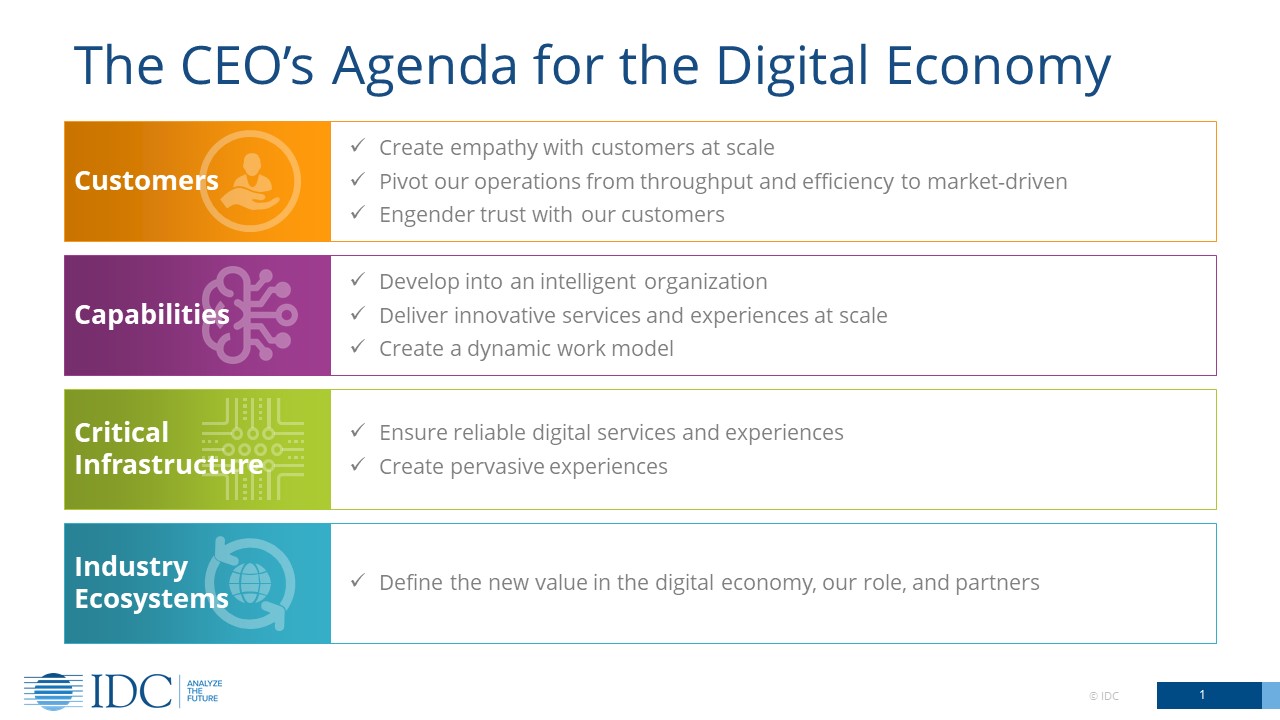The digital economy has been eagerly anticipated for years, but felt to be in the distant future. As we look towards 2020, we can see the digital economy appear on the horizon. By 2023, products and services from digitally transformed enterprises will account for more than half of the global GDP, according to IDC’s research, signalling digital supremacy.
With the onset of digital supremacy just 3 years away, CEOs will quickly find themselves running a new type of organization. And with that new organization comes a new agenda.
The CEO’s New Agenda
The CEO’s new agenda centers around meeting new customer requirements, developing new capabilities, ensuring new critical infrastructure, and participating in new industry ecosystems.
At least 70% of all CEOs who participated in IDC’s recent CEO survey believe all nine of these agenda items will be more or significantly more important for their organizations in the future.

Digital Transformation: Addressing Increased Customer Requirements
Consumer requirements are changing. This is being led by millennials, who seek more tailored experiences and products. As millennials come into their peak earning years, their requirements move front and center as many organizations rethink their customer engagement programs.
Create Customer Empathy at Scale
IDC predicts that by 2022, market demand for tailored experiences will double every six months in more than two-thirds of all industries. In order to create these tailored experiences, organizations need to collect tremendous amounts of personal data. We estimate by 2023, 40% of the data collected throughout the customer journey will be used to create a better product and a personalized experience.

Historically, this data/experience transaction has heavily favored the organizations collecting data; they received insight into their buyers in exchange for a small, one-time product discount or small token. Millennials are now calling into question this unwritten contract; 60% of millennials think companies are collecting too much personal information about them online, according to IDC’s ConsumerScape360 study. However, from the same IDC study, we see 55% of Millennials like it when applications and websites are personalized to them. This will drive a new unwritten contract – one where consumers will provide personal information if they receive personalized experiences in return. We refer to this as the continuous customer experience.
Pivot Operations to be Market-Driven
If enterprises are going to be creating these personalized experiences, products and services, they need to pivot their operations from throughput and efficiency to market-driven ops. Efficiency will never be unimportant, but resiliency will become more critical to success.
For example, a recent survey shows that 53% of millennials value a new or unique package shape or appearance, and that 81% of consumers have tried a new product simply because the packaging caught their eye. Digitally innovative organizations will want to experiment with different packages to create those personalized experiences their consumers value. As a result, the package manufacturers will need to adapt and create smaller, more agile production runs to create these package variants.
Expanding to the OT/IT buyer will require a significant shift in how organizations operate and sell, but it will have a significant payoff. In the next 3 years, 50% of operational organizations will have a blended organization that combines operational expertise and IT expertise to accommodate these market-driven operations needs.
Engender Trust with Customers
Digital trust is one of the most pressing concerns for both organizations and consumers. Buyers want to know that the companies they do business with are authentic and trustworthy – and that they will handle consumer data securely and ethically. Organizations need to demonstrate their authenticity and trustworthiness to maintain buyer loyalty.
Trust programs will become standard in the digital economy. IDC predicts that 2/3rd of the G2000 boards will ask for a formal trust initiative that executes a roadmap to increase an enterprise’s security, privacy protections and ethical execution.
Additionally, 50% of the G2000 will name a Chief Trust Officer, who will orchestrate trust across multiple business functions including security, finance, HR, risk, sales, production, and legal.
Digital trust will also need to extend into the algorithms and technologies that organizations employ to carry out their digital innovations. IDC predicts that by 2025, algorithms will require independent 3rd-party audits, and that 40% of Fortune 1000 companies will require their partners and vendors to meet established trust scores as a condition of their business relationship.
No organization will be exempt from displaying radical transparency and accounting for their digital authenticity and trust. Establish your organizations’ trust program before your customers demand it to gain a competitive edge in the digital economy.
The Tech Supplier’s New Agenda
Over the next three years, organizations will race to establish their position in the digital economy. Today we estimate 46% of organizations worldwide are digitally determined; they are on the path to a successful digital transformation. Next year, they will collectively spend $1.3 trillion dollars on technology and services to make that transformation.
To best serve these organizations through their digital transformation and in the digital economy, technology suppliers will need to develop a new agenda as well. Engaging with new buyers in the organization, putting technology into the context of business outcomes, and developing trust programs are just a few of the critical changes required.
Digital Transformation: Capabilities, Infrastructure, and Industry Ecosystems Also Important
Addressing these and other customer requirements is critically important to success, but it is only one area of the CEO’s agenda. There are 3 more areas containing six additional elements that will drive success in the digital economy. Check back next week to explore those elements, and to see how IDC’s evolving coverage of these elements will empower technology suppliers to better assess market opportunities, understand their buyers, and strengthen their go-to market ability to succeed in the digital economy.
As we discussed above, meeting and surpassing customer expectations is a high priority item for the CEO. See how the entire organization can help exceed customer expectations and deliver superior experiences with IDC’s animated infographic:




